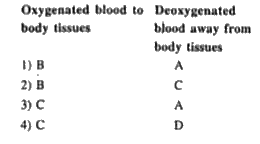Small blood vessel may get blocked in infection of
Plasmodium ovale
P. vivax
P. malariae
P. falciparum.
The correct Answer is:D
Step-by-Step Solution:
1. Understanding the Question: The question asks which infection leads to the blockage of small blood vessels. The options provided are different species of the Plasmodium protozoan.
2. Identifying the Organism: Plasmodium is a genus of protozoa that causes malaria. There are several species of Plasmodium, including Plasmodium ovale, Plasmodium vivax, Plasmodium malariae, and Plasmodium falciparum.
3. Mechanism of Infection: When a mosquito bites a human, it injects the Plasmodium parasites into the bloodstream. These parasites then invade red blood cells (RBCs) and replicate within them.
4. Effect of Plasmodium falciparum: Among the species listed, Plasmodium falciparum is known to cause the most severe form of malaria. It is particularly notorious for causing complications such as cerebral malaria.
5. Sticky Nature of Infected RBCs: In the case of Plasmodium falciparum infection, the infected RBCs produce sticky proteins on their surface. This stickiness causes the RBCs to adhere to the walls of small blood vessels.
6. Resulting Blockage: The adherence of these sticky RBCs to the blood vessel walls can lead to blockages. This blockage can restrict blood flow, leading to various complications, including organ damage.
7. Conclusion: Based on the information, the correct answer to the question is Plasmodium falciparum, as it is the species that causes blockage of small blood vessels during infection.
Final Answer: Plasmodium falciparum (Option 4).
---
Topper's Solved these Questions
- KINGDOM PROTISTA (UNICELLULAR EUKARYOTES)BOOK - DINESH PUBLICATION ENGLISHCHAPTER - KINGDOM PROTISTA (UNICELLULAR EUKARYOTES)EXERCISE - REVISION QUESTION FROM COMPETITIVE EXAMS.
298 Videos
- KINGDOM PROTISTA (UNICELLULAR EUKARYOTES)BOOK - DINESH PUBLICATION ENGLISHCHAPTER - KINGDOM PROTISTA (UNICELLULAR EUKARYOTES)EXERCISE - CHECK YOUR GRASP
19 Videos
- KINGDOM PLANTAE OR METAPHYTA BOOK - DINESH PUBLICATION ENGLISHCHAPTER - KINGDOM PLANTAE OR METAPHYTA EXERCISE - CYG
20 Videos
- LEAFBOOK - DINESH PUBLICATION ENGLISHCHAPTER - LEAFEXERCISE - CYG
10 Videos
Similar Questions
Knowledge Check
When outside temperature is high, the blood vessel gets dilated. This phenomenon is known as :
AVasodilationBVasoconstrictionCPeristalsisDExpiration
Tiny blood vessels supplying blood to the tissues of larger vessel walls are
View SolutionThe diagram shows the heart with its main blood vessels

Which blood vessels carry oxygenated blood to the body tissues and deoxygenated blood away from the body tissues ?

View SolutionThe blood vessel carrying metabolic wastes into the kidney is
View SolutionWhich of the blood vessel may be considered as true heart in earthworm ?
View SolutionThe blood vessel supplying blood into Bowman's capsule is
View SolutionName the blood vessels that supply oxygenated blood to the heart muscles.
View SolutionWhich blood vessel carries metabolic wastes into the kidney?
View Solution
